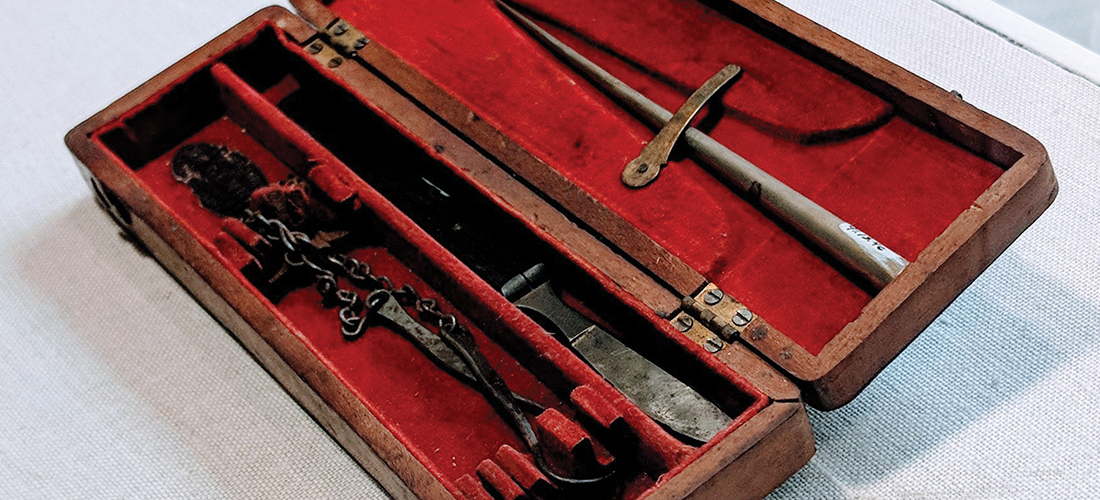Annie Alexander, North Carolina’s first female physician, transformed Charlotte’s medical landscape.
On a cold Cornelius Sunday in 1864, a public-health pioneer was born. The Civil War inched toward its close, and a new era in medicine was just beginning.
Annie Lowrie Alexander’s path was cleared well before her birth. Her father, John Brevard Alexander, was a prominent physician, disturbed by the health care limitations women faced in the male-dominated field.
“Her father knew that, because of the social norms of that time, women were not comfortable talking to men about so-called women’s issues, and there were tragic consequences as a result of that cultural shyness,” says Adria Focht, president of Charlotte Museum of History. The museum on Shamrock Drive houses a collection of now-primitive tools used during Alexander’s era.
When she was 14 years old, Alexander’s father began training her, even engaging a private tutor to ensure her acceptance into medical school. “He decided that he wanted to start the next female generation of physicians,” Focht says. “His daughter was going to be [his] first subject.”

Annie Alexander practiced medicine in Charlotte for more than 30 years. Examples of the now-primitive medical equipment (pictured, top) commonly used during the late 1800s and early 1900s are on display at Charlotte Museum of History.
Elizabeth Blackwell had paved the way as the first U.S. woman to receive a medical degree in 1849, eventually opening a medical college in New York City. But few, if any, Southern women had entered the field.
Alexander’s path wasn’t easy. Outraged at the idea of a woman as a medical doctor, some of her relatives initially avoided contact with her. Historical papers document the challenges she faced — men who made derogatory comments and even spit on her. Aggression and skepticism lingered behind every opened door. “My success will depend on my ability and the liberal views of the people among whom I will be,” she wrote to her father.
Armed with the discipline of a Capricorn, she pressed on. In 1884, following graduation from the Woman’s Medical College of Pennsylvania, Alexander moved to Baltimore, where, a year later, she earned her medical license. In a class of 100 candidates, of which she was the sole woman, she earned the highest marks. She was 21 years old.
Shortly after, she contracted pneumonia, then tuberculosis, both routine killers at the time. She left Maryland to convalesce under the Florida sun with an uncle. But when she learned of her brother’s death in North Carolina, she returned home and opened a practice at 410 North Tryon St.
The practice took time to build. At the close of her first year back in Charlotte, Alexander pocketed just two dollars. Eventually, given her grit and guts, Alexander gained the respect of her peers. She not only served on the staff of both St. Peter’s and Presbyterian hospitals, but she also led the Mecklenburg County Medical Society.
Bumping along country roads in a buggy pulled by her horse, Conrad, “Dr. Annie” tackled the biggest threats of the day — tetanus, tuberculosis, the flu. Malaria was also a major problem, given the hot, humid North Carolina summers when menacing mosquitoes flourished in ditches and rain barrels.
Dressed in a white, long-sleeved blouse, ankle-length skirt and boater hat tied with dark ribbon, she witnessed how poor living conditions played a role in the diseases and early deaths of young mothers and children. She spoke and wrote about nutrition and sanitation to help people make better choices.
An egalitarian, she treated patients from all backgrounds, of any race, and her work at the Florence Crittenton Home for Unwed Mothers stands out.
“She was the Planned Parenthood of her era,” Focht says, focusing her practice on obstetrics and gynecology and educating young women on hygiene and health concerns. “That’s why her family wanted her to go into medicine.” She also served as manager at the YWCA and was the attending physician at both institutions, plus the physician for students at Presbyterian College for Women, now Queens University of Charlotte.
Standing on a small wooden stool, she performed surgeries on the soldiers at Camp Greene, a U.S. Army camp based in Charlotte during World War I. “She was truly heroic in her time as a health care worker, exposing herself to all these diseases,” Focht says.
As with most of Charlotte’s past, Alexander’s home and medical practice no longer stands. But in December 2016, a Pitt County high-school student and aspiring nurse worked to honor Alexander’s legacy. After researching Alexander for a school project, the student nominated her for a state highway historical marker. The marker stands at the site of the medical practice on N. Tryon Street, where Alexander worked for more than 30 years.
Every spring, Alexander is remembered through reenactments at Charlotte’s historic Elmwood Cemetery. Presented by the Mecklenburg Historical Association, Voices from the Past invites guests to interact with costumed portrayers of Charlotte’s founding fathers and pioneering civic leaders. Due to the COVID-19 outbreak, this year’s event was canceled.
Like the essential workers fighting today’s pandemic, Annie Alexander placed herself at risk every day. In 1929, while caring for a patient with pneumonia, “Dr. Annie” contracted the infection. She died on a Tuesday in mid-October, a pioneer of progress.


